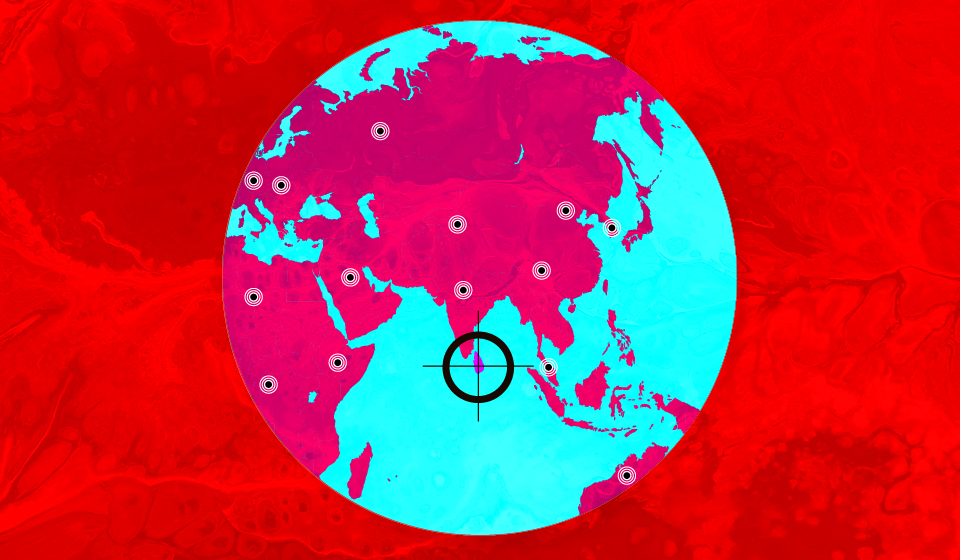
Sri Lanka blasts: ISIS may have lost territory and fighters but not venom

The dreaded jihadist organisation, Islamic State, has reportedly claimed responsibility for the Easter day serial bombings in Sri Lanka (April 21). The island nation, predominantly peaceful in the past decade, saw 321 deaths in the ghastly attack.
The attack, planned and executed in a staggered manner through the day, looked unending as explosions occurred at regular intervals. Security experts and intelligence agencies were by then looking for patterns to pin it up to any ‘history-sheeted’ organisation. That no organisation claimed responsibility for the attack baffled the authorities. Islamist terror groups have, as a tradition, claimed responsibility immediately after an attack.
The ISIS’s choice of Sri Lanka points to two things – that it is not time yet, as the US-led coalition claims, to rule out the group and their penetrative, well-entrenched, and relatively impregnable communication links. There is significant fall in territorial control and the number of operatives and fighters. But the organisation has of late been scouting for impressionable youths from across the world to execute lone wolf and stand-alone attacks. The indoctrination of youths is carried out either in person by IS volunteers or on social media. The Wall Street Journal, in 2015, had put out a chart which depicted how the ISIS categories various social media platforms as ‘safest,’ ‘safe,’ ‘moderately safe,’ and ‘unsafe.’ The safest platforms include SilentCircle, Redphone, OSTel, ChatSecure, and Signal. Those interested are actively urged to contact the volunteers on the ‘safest’ platforms available. Robin Wright wrote in the Newyorker.com on April 16 that the ISIS underground cells had ‘the basic capabilities’ in spite of a massive loss of territory and men.
ISIS ideology
The ISIS claims itself to be proto-state. This means, the group intends to create a state but is not fully autonomous. IS differs from the al-Qaeda, to which it initially owed allegiance, in the manner in which it announced a caliphate, as a front-runner to the proto-state. The ISIS, at the height of its reign, ruled a territory as big as the United Kingdom and over two million people, says The ISIS Caliphate: From Syria to the Doorsteps of India, a book that traces the development and activities of the terror group. The group differs from other jihadist organisations in its ardent following of the Islamic eschatology which concerns life after death. It is known as Yawm al-Qiyamah or Yawm ad-Din, meaning day of judgement. The ISIS sticks to the Wahhabist doctrine which advocates violent negation of all modernity and liberality including indulgence in arts, music, other religions. The ISIS prescribed a syllabus for schools under its acquired dominions which was shorn of all these. The Islamist manual by Abu Bakr Naji, published on the internet in 2014, asks the terror group to focus on all Muslim nations first before venturing out to deal with non-Muslim states. That the ISIS has not yet attained success completely in converting Muslim states to Wahhabism is some ‘solace’ to the rest of the world.
India connect
The states of Jammu and Kashmir and Kerala are reportedly the ISIS’s major recruitment grounds. Kashmir geographic proximity to IS-held territories and the special geo-political situation made it the obvious choice. Kerala’s presence on the jihadist group’s radar baffled the authorities. Intelligence agencies had said in June 2018 that ISIS middlemen had drafted the services of religious centres in at least two northern and one southern district in Kerala to recruit young men. They would then be transported to countries like Syria and Yemen, where the IS had a presence.
Reports said, as on March 30, 2018, 90 Keralites were with the ISIS. Of this, 16 had been killed in raids by US and other forces since 2016. Of the 90, 21 were from the northern-most district of Kerala called Kasaragod and 38 from Kannur. At least 12 were from Bahrain.
Why Sri Lanka
“This bloody day is our reward to you,” is how the ISIS described the Sri Lanka carnage as per a report in news.com.au. The ISIS’s attack was to avenge the March 15 New Zealand killings. The IS choice of Sri Lanka is possibly to show the world that it can zero in on any country, especially a soft target where none expects it, as vulnerable a target as the one chosen by the lone wolf, Brenton Tarrant, in New Zealand’s Christchurch killings.


